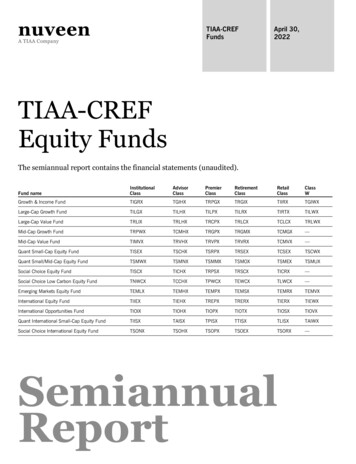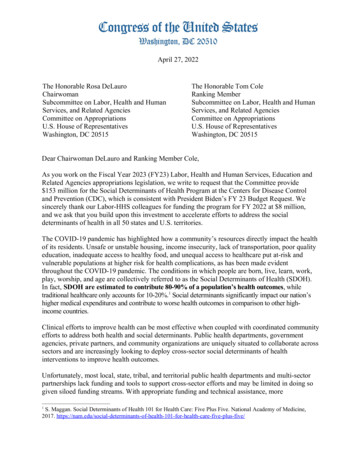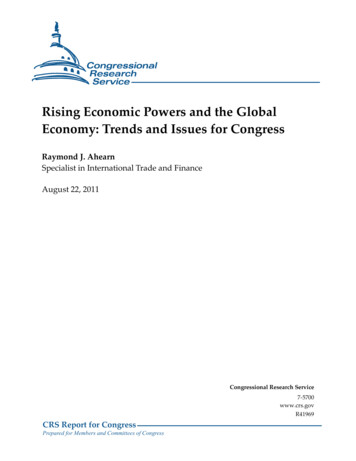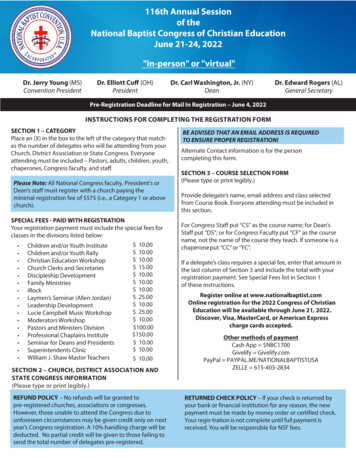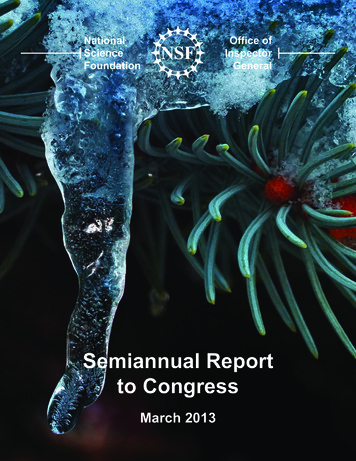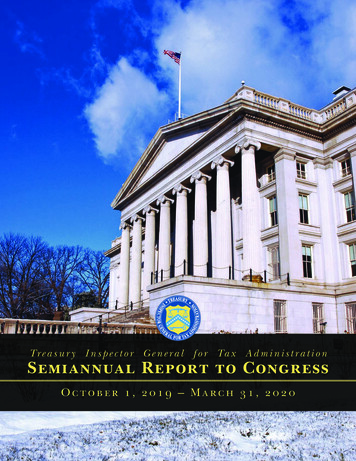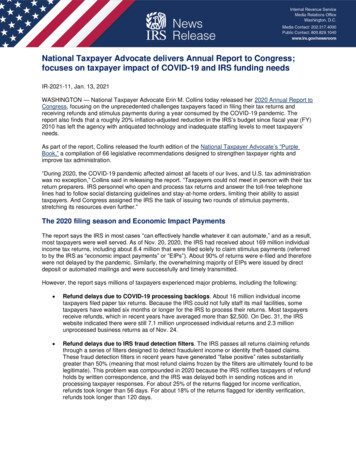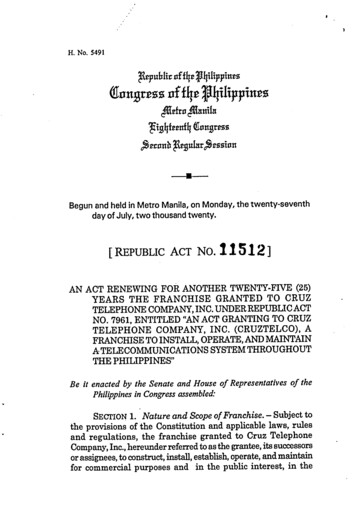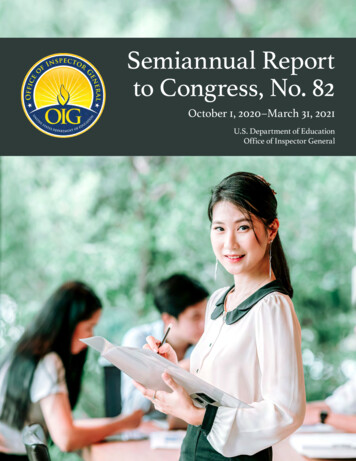
Transcription
Semiannual Reportto Congress, No. 82October 1, 2020–March 31, 2021U.S. Department of EducationOffice of Inspector General
Office of Inspector GeneralSandra D. BruceActing Inspector GeneralMay 2021This report is in the public domain. Authorization to reproduce it in whole or in partis granted. While permission to reprint this publication is not necessary, the citationshould be: U.S. Department of Education, Office of Inspector General, SemiannualReport to Congress, No. 82.Please Note:The Office of Inspector General’s Semiannual Report to Congress, No. 82 is availableon the ED OIG website at .html.All images used under license from Shutterstock.com.
Message from Acting Inspector GeneralSandra D. BruceOn behalf of the employees of the U.S. Departmentof Education (Department) Office of InspectorGeneral (OIG), I want to open this SemiannualReport by acknowledging the lives of the more than550,000 people we lost in this country due to thecoronavirus disease 2019 (COVID-19) pandemic. Althoughwe are grateful for the availability of vaccines and theactions Americans are taking to protect themselvesagainst the spread of COVID-19, our thoughts go outto the families and friends of those who lost their livesto the pandemic. We pray that the memories of theirloved ones are a comfort and will help them throughthese difficult times.I also want to acknowledge America’s teachers, faculty,staff, students, and their families for their continuedresiliency, patience, flexibility, and creativity. We knowit has not been easy, but their unwavering commitmentto educating children through whatever means possibleis nothing short of inspirational.Here at the OIG, March 16, 2021, marked 1 year ofworking in a 100-percent telework posture, with anexception for OIG criminal investigators working onmission-essential activities. I am so proud of this staff fortheir fortitude and for their commitment to our missionand to one another. Like many Americans, OIG staffhave had to juggle to find balance between conductingtheir work while also providing care and overseeingschooling for their children or taking care of agingparents. Working together, our team developed andimplemented a range of communication methods andinitiatives to keep everyone informed and connected sowe could continue to meet our operational goals. Thisresiliency enabled us to create new ways of approachingand conducting our oversight and law enforcementefforts so we could meet our responsibilities on behalfof America’s taxpayers and students. This includesour oversight work related to the historic levels ofemergency funding the Congress authorized to theDepartment to help States and schools meet theirneeds and the needs of their students impacted by theCOVID-19 pandemic. Our work involving these funds iswell underway and will increase as States and schoolsfurther disburse and spend this funding. You will findthe results of our early work involving COVID-19 inthe pages of this Semiannual Report, which presentsthe activities and accomplishments of the OIG fromOctober 1, 2020, through March 31, 2021.In our audit-related work, we issued 13 reports, identifiedmore than 7.6 million in questioned and unsupportedcosts, and offered recommendations aimed at improvingDepartment programs and operations. Examples ofthis audit work are highlighted below. In addition,we completed 51 quality control and desk reviews ofrequired audits submitted by recipients of Departmentfunding. You will find the results of that work beginningon page 43 of this report. Our inspection found that 81 of the 100 institutions included in our review complied withCoronavirus Aid, Relief, and Economic SecurityAct (CARES Act) Higher Education EmergencyRelief Fund (HEERF) Institutional Portionreporting requirements. We noted that 80 ofthe institutions posted reports on their websites;however, we were unable to locate InstitutionalPortion reports anywhere on the websitesassociated with 19 of the 100 institutions. These19 institutions had drawn down over 5.5 millionout of almost 29 million awarded to theseinstitutions under the Institutional Portion ofHEERF as of September 30, 2020. Our audit of the Florida Department ofEducation’s internal controls over TemporaryEmergency Impact Aid for Displaced Studentsprogram funding found that Florida did notensure that the data provided to the Departmentwere accurate and complete because it did notalways prevent or detect inaccurate displacedstudent counts that local educational agenciesreported. As a result, the two local educationalagencies had unsupported costs totaling 5.13million. Our audit of the University of Texas at SanAntonio’s (San Antonio) controls related to theJeanne Clery Disclosure and Campus SecurityPolicy and Campus Crime Statistics Act (CleryAct) found that the school did not have effectivecontrols to ensure that it reported complete and
accurate Clery Act crime statistics. San Antoniohad processes for requesting crime statisticsfrom local law enforcement agencies, identifyingcampus security authorities, processing andcompiling the crime information, and reportingthe annual Clery Act crime statistics by thereporting deadline. However, these processeswere not effectively designed or consistentlyperformed during the audit period and did notprovide reasonable assurance that the reportedClery Act crime statistics would be completeand accurate. Our fiscal year (FY) 2020 Federal InformationSecurity Modernization Act of 2014 (FISMA)review concluded that although the Departmenthad several notable improvements in implementing its cybersecurity initiatives, its overallinformation technology security programs andpractices were not effective in all five securityfunctions. We had findings in all eight metricdomains, which included findings with the sameor similar conditions identified in prior FISMAreports. Until the Department improves in theseareas, it cannot ensure that its overall information security program adequately protects itssystems and resources from compromise andloss.For FY 2020, although the Department andFederal Student Aid (FSA) received unmodified opinions on their financial statements,the auditors identified a material weakness inthe Department’s controls over the reliabilityof underlying data used in credit reform reestimates of the subsidy costs of its student loanprograms. The auditors also identified three significant deficiencies: one involving informationtechnology controls; another involving its monitoring controls of an information technologyservicer responsible for internal controls at adata center; and third, an entity-wide deficiencyin its overall control environment. Ineffectivecontrols impact management’s ability to prevent,detect, and correct errors and can increase therisk of unauthorized access to the Department’ssystems. The auditors also found one instanceof reportable noncompliance with Federal lawrelated to referring delinquent student loandebts to the U.S. Department of the Treasury. Our inspection report on the Department’sRecognition of the Accrediting Council forIndependent Colleges and Schools (ACICS)as an accrediting agency determined that theDepartment’s process for assessing ACICS’compliance with Federal regulatory criteriafor recognition followed applicable policiesand regulations with one exception. Duringthe 2016 recognition review, the Department’sprocess did not consider all available relevantinformation during its review as required. We alsodetermined that the Department implementeda process for assessing ACICS’ compliance withrecognition criteria following a court remandin 2018 that was permitted under applicablepolicies and regulations as well as the court’sremand order.In our investigative work, we closed 21 investigationsinvolving fraud or corruption and secured more than 16.5 million in restitution, settlements, fines, recoveries,forfeitures, and estimated savings. As a result of thiswork, criminal actions were taken against numerouspeople, including current and former school officials andservice providers who cheated students and taxpayers.Our investigative work included the following. Criminal and civil actions were taken againstseveral educational services providers for fraud.This included guilty pleas by three peopleand sentencing for one person involved in a 24 million tutoring scheme perpetrated byCreative Educational and Psychological Services,who charged the Puerto Rico Department ofEducation for tutoring services never provided;the imprisoned owners of Brilliance Academy,who agreed to pay the Department 4 millionfor misappropriating Federal funds that weremeant to provide tutoring services to underprivileged students; and a 1.18 million settlement byInnovative Educational Programs, LLC, to settleclaims that it improperly billed and obtainedFederal funds for after-school tutoring servicesthat it never provided. Six former administrators at the Columbus,Georgia, campus of the Apex School of Theologywere indicted on charges related to their rolesin a student aid fraud scam. The administrators allegedly recruited people to enroll in theschools with promises of “free money” and thatthey wouldn’t have to attend classes or do any
of the work—all they had to do was agree tosplit their student aid award balances with theadministrators. Criminal actions were taken in multimillion-dollarfraud cases involving charter school officials.This included a prison sentence for the formerchief executive officer of the now-closed BradleyAcademy of Excellence in Arizona for his role ina 2.5 million fraud scheme and a guilty plea bythe former head of the Community PreparatoryAcademy charter school for stealing more than 3 million from the schools.Two former Alabama school superintendentsand four others were indicted for their roles ina fraud scheme that targeted the State fundingfor virtual schools. According to the indictment,the conspirators offered various inducementsto private schools in exchange for studentdata that the conspirators then used to createphony student records showing those studentsas attending Alabama virtual schools. Thoserecords and related academic materials weresubmitted to the Alabama State Department ofEducation, which then paid the school districtsmillions of dollars for supposedly educatingthese private school students, who at no timeattended the virtual schools. The conspiratorsare alleged to have skimmed a portion of thatState money for their personal use. The former secretary of the Puerto RicoDepartment of Sports and Recreation and otherswere sentenced for their roles in a kickback,fraud, and money laundering conspiracyinvolving more than 9.8 million in fraudulently awarded contracts. The former secretaryawarded federally funded contracts without acompetitive bidding evaluation process andawarded contracts for services at inflated prices.Federal funds fraudulently obtained throughthis scheme were used to operate and promoteboxing events, television shows, travel, politicalcampaigns, and business ventures. Members of student aid fraud rings were sentenced, pled guilty, or were indicted for theirroles in student aid fraud rings, including a guiltyplea by a woman in California for participatingin a ring that targeted more than 3 million inFederal student aid; a guilty plea by a memberof another California-based ring that targetedmore than 1 million in Federal student aid; awoman charged in Michigan for participatingin a ring that targeted 600,000; and sentencesof probation for two members of fraud ringsbased in Texas that targeted 550,000 in Federalstudent aid.Our Semiannual Report also contains information onother efforts the OIG completed during this reportingperiod. This includes our required non-Federal auditrelated work and other reports issued during thereporting period, such as our FY 2021 ManagementChallenges report, our FYs 2021–2022 Annual Plan, anda report that I am particularly proud of: our FY 2020Diversity, Equity, and Inclusion Annual Progress report.That report shows what we accomplished duringthe first year in implementing our 5-year Diversityand Inclusion Strategic Plan and presents the goalsand strategies we are employing in FY 2021. We willcontinue to expand our organizational culture thatencourages collaboration, flexibility, and fairness sowe can continue to meet our mission, exceed ourgoals, and produce quality work that is accessible tothe diverse public we serve. Lastly, this SemiannualReport includes summary tables and tables containingstatistical and other data as required by the InspectorGeneral Act of 1978, as amended, and other statutes.To the members of the U.S. Congress, we thank youfor all that you are doing to help our nation during thepandemic, particularly through passage of the CARESAct, the Coronavirus Response and Relief SupplementalAppropriations Act, and the American Rescue Plan.The OIG will fulfill its responsibilities set forth in thesemeasures by ensuring that the funding provided to theDepartment and its grantees is used as intended andby investigating misuse, theft, or other criminal activityinvolving these funds. As a member of the PandemicResponse Accountability Committee established by theCARES Act, we will work tirelessly with our colleaguesto help ensure that all of the funding you allotted isprotected from fraud, waste, and abuse. Our nationdeserves nothing less. In closing, to all reading thisreport, thank you for your interest in and support ofour efforts. Please stay well by taking appropriateaction to protect yourselves, your loved ones, andyour communities.Sandra D. BruceActing Inspector General
Contents2Coronavirus Response andRelief Oversight8Federal Student AidPrograms and Operations20Elementary, Secondary, andSpecial Education Programs34Department Managementand Operations42Other OIG Efforts51Required Reporting73Acronyms and Abbreviations
Coronavirus Relief Aid andDisaster RecoveryThe U.S. Department of Education (Department) has beencharged with allocating billions of dollars to assist States, K–12schools, school districts, and institutions of higher education inmeeting their needs and the needs of their students impacted bythe coronavirus disease 2019 (COVID-19). The Office of InspectorGeneral (OIG) has been charged with ensuring that these vitalfunds are used as required and reach the intended recipients,and with investigating misuse, theft, and other criminal activityinvolving these funds.
Office of Inspector General Semiannual Report3ReportsThe Coronavirus Aid, Relief, and Economic Security Act (CARES Act) was passedby Congress on March 27, 2020. The bill allotted 2.2 trillion to provide fast anddirect economic aid to the American people negatively impacted by the COVID-19pandemic. Of that money, about 14 billion was given to the Department toadminister the Higher Education Emergency Relief Fund (HEERF). The HEERF providesfunding to institutions for emergency financial aid grants to students for expensesrelated to the disruption of campus operations due to the COVID-19 pandemic.Institutions receiving these funds are required to submit a report to the Secretaryof Education describing the use of funds distributed. This includes a quarterlyreport that must be posted on the institution’s website. The first report was dueon October 30, 2020, covering the period from the first award through September30, 2020. During this reporting period, we conducted an inspection to determine(1) whether selected institutions receiving funding under the Institutional Portionof the HEERF met public reporting requirements and (2) the reported usage of theInstitutional Portion of the HEERF by selected institutions. We reviewed the firstquarterly report for 100 institutions, which included 20 institutions that receivedthe highest amount of funding under the Institutional Portion of the HEERF anda randomly selected sample of public, private, for-profit, and other institutions. Asummary of the inspection follows.Higher Education Emergency Relief Fund ReportingRequirementsWe determined that 81 of the 100 institutions complied with Institutional Portionreporting requirements. We noted that 80 of the institutions posted reports on theirwebsites dated on or before the October 30, 2020, deadline and that 1 posted areport dated October 31, 2020. We were unable to locate the Institutional Portionreports associated with 19 (19 percent) of the 100 institutions included in oursample anywhere on the websites. These 19 institutions had drawn down over 5.5 million out of almost 29 million (19 percent) awarded to these institutionsunder the Institutional Portion of the HEERF as of September 30, 2020, the end of thereporting period. We found that 6 (22 percent) of the 27 institutions in our sample
4 Office of Inspector General Semiannual Reportthat reported expenditures in the Other Uses category did not follow Departmentinstructions or did not provide sufficient detail.According to the posted quarterly reports, as of September 30, 2020, the 81 reportinginstitutions have spent over 283 million (45 percent) of the total InstitutionalPortion funds obligated to them. Of the 81 institutions that reported, we notedthat the most frequently reported expenditure categories included Campus Safety(48 institutions), Additional Distance Learning Equipment (41 institutions), TuitionReimbursement (35 institutions), Technology Hardware (29 institutions), and OtherUses (27 institutions). The majority of the funding was spent on Tuition Reimbursement(56 percent). Conversely, the least frequently reported categories by the 81 reportinginstitutions included Subsidized Off-Campus Housing (7 institutions) and SubsidizedFood Service (4 institutions). Overall, institutions spent less than 4 percent ofInstitutional Portion funds on Subsidized Off-Campus Housing (2 percent), AdditionalClass Sections (0.7 percent), Internet (0.6 percent), Staff Training (0.4 percent), andSubsidized Food Service (0.1 percent). During our review, we also noted anomaliesregarding awards and recipient identifiers that we brought to the Department’sattention, and suggested they review the anomalies and take corrective action aswarranted. The Department agreed with our suggestions. HEERF ReportInvestigations and OutreachBelow you will find information on an OIG coronavirus aid investigation and anupdate on our coronavirus fraud awareness and outreach efforts.Two Louisiana College Students Charged with IdentityTheft Associated with the HEERF Program (Louisiana)Two Louisiana College students were charged with identity theft in a conspiracy tofraudulently get coronavirus HEERF aid for their own use. According to the indictment,the two and others obtained the student identification numbers and passwords ofnine students and without authority, accessed the school’s student portal wherethey applied for HEERF grants in the names of those students and directed the grantpayments to bank accounts controlled by members of the conspiracy. Press ReleaseOIG Investigation Identified Issue with HEERF GrantsAwarded to Now-Closed SchoolThe OIG investigated a matter involving a proprietary IHE that received nearly 54,000 in HEERF grants in July 2020, and then closed in October 2020. The schooldid not notify the students ahead of the closure nor did it provide the students withany of the grant funds. We shared this information with the Department’s Officeof Postsecondary Education (OPE), which was not aware the school had closed butnoted that the school had not drawn down any of the HEERF grant. Nonetheless,OPE initiated a stop payment on the HEERF grant funds, preventing the now-closedschool from obtaining them.
Office of Inspector General Semiannual Report5New Fraud AwarenessMaterials and OutreachDuring this reporting period, the OIG creatednew materials aimed at helping schoolemployees from kindergarten through college,Governors’ offices, and law enforcementorganizations identify and report potentialfraud involving coronavirus response and relieffunds to the OIG. This included a digital bookletand a one-page flyer. The materials highlightwhat education-related coronavirus fraud couldlook like and provides information on freeresources to help identify and report to theOIG’s Special Investigations Unit. Also duringthis reporting period, Special Investigations Unitand regional investigative staff continued toconduct outreach to stakeholders on identifyingand reporting fraud, including hosting a webinar before the National Associationof Student Financial Aid Administrators on working with the OIG to identify andstop coronavirus-related fraud. They also continued to participate on Federal-StateCOVID-19 task forces and work groups. These task forces are a collective of Federaland State law enforcement and prosecutive entities combining their investigativepower to quickly address fraud complaints and to identify, investigate, and prosecutefraud related to the pandemic.Guidance to Non-FederalAuditorsThe Inspector General Act of 1978, as amended, requires that inspectors generaltake appropriate steps to ensure that any work performed by non-Federal auditorscomplies with Government Auditing Standards. This includes issuing audit guidesto help independent public accountants or audit organizations performing auditsof participants in the Department’s programs. During this reporting period, the OIGdeveloped and issued a new audit guide for proprietary schools receiving HEERFgrants. The guide is to be used by auditors of all proprietary schools receiving anyHEERF grants, except those proprietary schools that (1) spent less than 500,000 intotal HEERF grant funds, whether received under the CARES Act, the CoronavirusSupplemental Appropriations Act, the American Rescue Plan, or any future actsduring the fiscal year and (2) are not otherwise on heightened cash monitoring 1or 2 status during the fiscal year in which it spent any HEERF grant funds and aretherefore exempt from HEERF compliance audits.OIG staff also participated in a training session at the 2020 American Institute ofCertified Public Accountant's Governmental and Not-for-Profit Training Program,which provided a regulator's viewpoint on (1) the impact of the COVID-19 pandemicon single audits, (2) quality control and desk reviews and common trends that arebeing found, and (3) Federal oversight activities of COVID-19 funding.
6 Office of Inspector General Semiannual ReportPandemic ResponseAccountability CommitteeThe CARES Act established the Pandemic Response Accountability Committee (PRAC),composed of inspectors general from across the Federal government. The PRACis tasked with conducting, coordinating, and supporting inspectors general in theoversight of the trillions of dollars in emergency Federal spending to address theeconomic impacts of the COVID-19 pandemic. The CARES Act named nine agencyinspectors general to the Committee, including the U.S. Department of Education.Acting Inspector General Sandra D. Bruce represents the OIG on the PRAC, chairsthe PRAC’s subcommittee focused on Government Accountability Office and Stateand local oversight efforts, and is a member of the PRAC Financial Sector OversightWorkgroup. During this reporting period, the PRAC Financial Sector OversightWorkgroup held two listening sessions: the first focused on coronavirus funding andoversight challenges facing the banking sector; the second focused on challengesfacing the borrower community, particularly challenges facing communities of color.Acting Inspector General Bruce moderated the second discussion, which includedorganizations representing the perspective of small business borrowers: the NationalBlack Chamber of Commerce and Illinois State Black Chamber of Commerce, U.S.Hispanic Chamber of Commerce, and the Small Business Roundtable. A video ofthe session is available here.Also during this reporting period, the PRAC Government Accountability Office, State,and Local Subcommittee launched its “Listening Post” series—small discussiongroups including State and local auditors; State treasurers; certified public accountantfirms for tribal entity operations; American Institute of Certified Public Accountants;the U.S. Government Accountability Office; other IGs; and the National Associationof State Auditors, Comptrollers, and Treasurers. These Listening Posts provide anopen and safe forum to discuss challenges, concerns, and best practices; facilitatecoordination of audit, program, and other work when possible; and perhaps bestof all, help find solutions to challenges in real time. The PRAC held two ListeningPost sessions during this reporting period.Finally, the OIG is participating in a number of PRAC cross-cutting projects: (1) amultiagency study focusing on the timing of State agencies’ drawdowns ofcoronavirus response and relief funds, (2) a multiagency project required by theCARES Act specific to contract grants and staffing projects, and (3) a look at recipientsreceiving coronavirus response and relief funds from multiple Federal programsfor the same purpose (multidipping).
Office of Inspector General Semiannual Report7OTHER ACTIVITIESParticipation on Committees, Work Groups, and Task Forces PRAC. Acting Inspector General Sandra D. Bruce is a member of this Committee, established underthe CARES Act. Acting Inspector General Bruce is also leading the PRAC’s subcommittee focused onGAO and State and local oversight efforts and is a member of the Financial Sector Oversight WorkGroup. Assistant Inspector General for Investigation Services Aaron Jordan serves as an Advisory Boardmember to the PRAC’s Fraud Task Force, and Deputy Assistant Inspector General for InvestigationServices Shafee Carnegie serves on the PRAC’s Investigations Training Subcommittee. Staff membersfrom our Information Technology, Audits, and Computer Crime Investigations component serve onthe Data Analytics Group and the Pandemic Analytics Center for Excellence. Council of Counsels to the Inspectors General COVID-19 Work Group. Counsel to the InspectorGeneral Antigone Potamianos and OIG Assistant Counsels continued to participate in the governmentwide OIG attorney working group regarding COVID-19 related legal issues. Procurement Collusion Strike Force. Assistant Inspector General for Investigations Aaron Jordancontinued to coordinate with the Department of Justice Antitrust Division on efforts related to COVID-19. Coronavirus/COVID-19 Federal-State Task Forces. OIG criminal investigators continued to work withtheir Federal and State investigative and prosecutive partners to address COVID-19 fraud.
Federal Student AidPrograms and OperationsThe Federal student financial aid programs have longbeen a major focus of our audit and investigative work.These programs are inherently high risk because of theircomplexity, the amount of funds involved, the number ofprogram participants, and the characteristics of studentpopulations. OIG efforts in this area seek not only to protectFederal student aid funds from fraud, waste, and abuse, butalso to protect the interests of the next generation of ournation’s leaders—America’s students.
Office of Inspector General Semiannual Report9Audits and InspectionsThe he Department disburses about 121 billion in Federal student aid annuallyand manages an outstanding loan portfolio valued at more than 1.5 trillion. Thismakes the Department one of the largest financial institutions in the country. Assuch, effective oversight and monitoring of its programs, operations, and programparticipants are critical. Within the Department, OPE and FSA are responsible foradministering and overseeing the student aid programs. OPE develops Federalpostsecondary education policies, oversees the accrediting agency recognitionprocess, and provides guidance to schools. FSA disburses student aid, authorizesschools to participate in the student aid programs, works with other participantsto deliver services that help students and families finance education beyond highschool, and enforces compliance with FSA program requirements. During thisreporting period, OIG work identified actions that FSA and OPE should take toaddress weaknesses in program operations and management. Summaries of thesereports follow.The Department’s Recognition of the AccreditingCouncil for Independent Colleges and Schools as anAccrediting AgencyThe objectives of our inspection were to determine the Department process forassessing the Accrediting Council for Independent Colleges and School’s (ACICS)compliance with Federal regulatory criteria for recognition, what evidence theDepartment considered in its review of selected recognition criteria, and whether itsconclusions were supported by evidence. Our inspection covered the Department’sprocesses from 2016 through 2018.Based on our review, we determined that the Department’s process followedapplicable policies and regulations for the time period of our review, except duringthe 2016 recognition review. During its 2016 review of ACICS’ petition for recognition,the Department did not consider all available relevant information during its reviewas required. Specifically, the Department had requested and received informationfrom ACICS that was relevant to the recognition review but did not include andconsider that information as part of its review. Our inspection found that Office of the
10 Office of Inspector General Semiannual ReportUnder Secretary officials under Secretary of Education John King decided to moveahead with the recognition process even after being informed by Department staffthat doing so would not leave enough time to review the volume of informationrequested from and submitted by ACICS. As a result, ACICS successfully challengedthe Department’s 2016 decision to derecognize ACICS.Further, our inspection determined that the Department implemented a process forassessing ACICS’ compliance with recogniti
Academy of Excellence in Arizona for his role in a 2.5 million fraud scheme and a guilty plea by the former head of the Community Preparatory Academy charter school for stealing more than 3 million from the schools. Two former Alabama school superintendents and four others were indicted for their roles in
